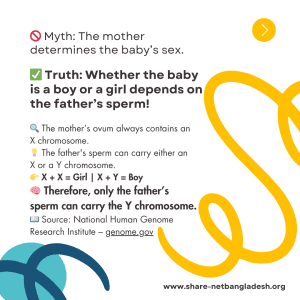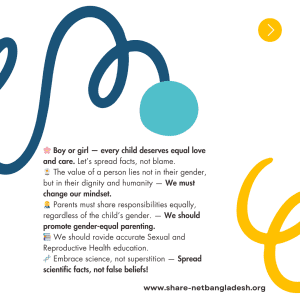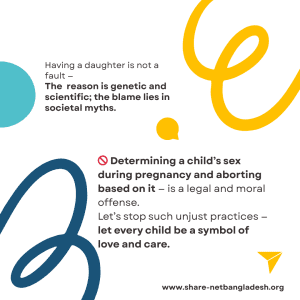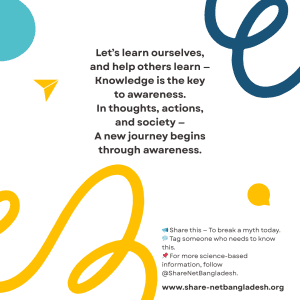Science, Not Shame: The Truth About Child Sex Determination in Bangladesh
In Bangladesh, like in many parts of South Asia, the birth of a girl is often met with silence, disappointment, or even blame. For generations, harmful myths have circulated in society — one reason, vital among them is the belief that it is the mother who determines the sex of the child. These unscientific ideas do more than just misinform; they fuel discrimination, physical and emotional abuse, and even violence against women. However, science tells a different, empowering story—one that we must spread to dismantle stigma and promote gender equality.
The Genetics Behind Gender
At the core of sex determination is a simple yet profound scientific fact: it’s the father’s genetic contribution that determines whether a baby will be a boy or a girl.
Biologically, every human carries a pair of sex chromosomes. The mother’s egg always contributes an X chromosome. The father’s sperm can carry either an X or a Y chromosome. When the sperm carrying an X chromosome fertilizes the egg, the resulting combination is XX—a girl. If a Y chromosome-carrying sperm fertilizes the egg, the result is XY—a boy.
In other words, it is the father’s sperm—not the mother’s egg—that determines the sex of the child. This fact is well established and recognized by global scientific authorities, including the U.S. National Human Genome Research Institute.
Yet, the persistence of myths often overshadows this basic biology in Bangladesh.

Social Consequences of Scientific Illiteracy
The consequences of such misconceptions are devastating. A 2019 survey conducted by UNFPA Bangladesh revealed that one in every three women faces family pressure or is blamed for giving birth to a girl. This blame can escalate into physical and psychological abuse, contributing to a culture of shame and silence around childbirth and reproductive health.

In both rural and urban areas, many women silently endure humiliation from spouses or in-laws who falsely believe that the “failure” to produce a son lies with the mother. This harmful narrative also encourages dangerous practices such as sex-selective abortion, which is both illegal and unethical.
Gender Equality Begins with Knowledge
Correcting these myths requires a collective cultural and educational shift. As highlighted in Share-Net Bangladesh’s #Chromosome_Talk campaign, scientific awareness is key. We must foster open conversations around reproductive health that are grounded in evidence, not superstition.
Equally important is the role of accurate sexual and reproductive health education—starting at school and extending into communities. Parents, teachers, health workers, and religious leaders must all take part in challenging outdated beliefs and promoting a science-based understanding of gender and reproduction.

Changing the Narrative
It is time to change the narrative from blame to love, from ignorance to knowledge. Every child, regardless of gender, deserves equal care, respect, and opportunity. Gender does not define the worth of a person—character, kindness, and dignity do.
Let us reject the notion that a daughter is a disappointment. Let us stop questioning the mother’s “ability” to give birth to a son. Instead, let us hold space for facts: sex is genetically determined by the father’s chromosomes. There is no fault in giving birth to a girl—there is only fault in blaming her birth.

A Call to Action
If we wish to build a more just and inclusive Bangladesh, we must begin with the truth. We must empower people with the knowledge to stand against gender-based discrimination and violence. And most importantly, we must teach the next generation that equality begins in the womb—with dignity and love for every life, regardless of gender.
Together, let’s break the myth. Let’s end the blame. And let’s build a Bangladesh that celebrates every child as a symbol of hope, not shame.

Sources:
- UNFPA Bangladesh (2019)
- National Human Genome Research Institute (genome.gov)

